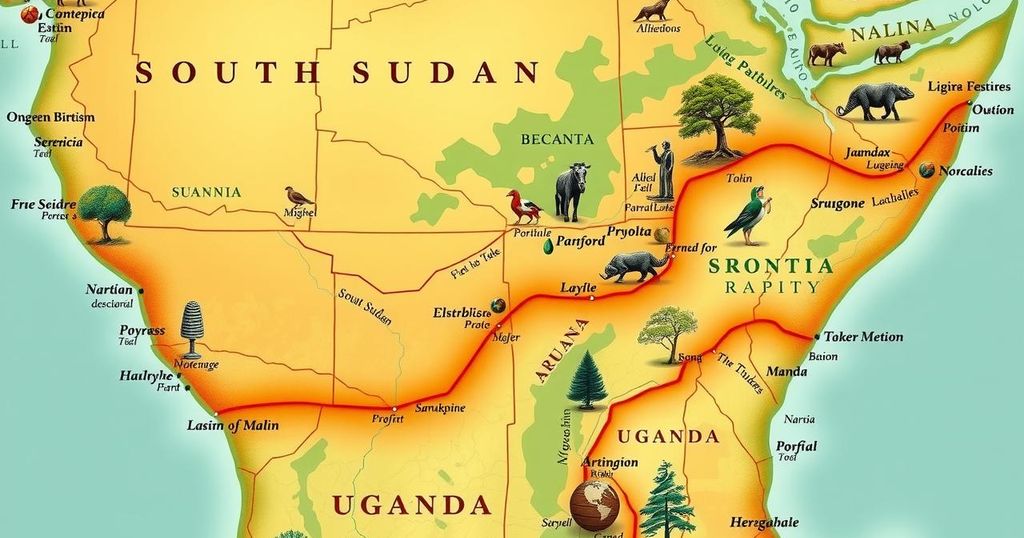Global news
AFRICA, CENTRAL AFRICA, CIVIL WAR, CONFLICT RESOLUTION, GREATER YEI RIVER COUNTY, IGAD, LRA, NASIR, REFUGEES, RI, RIEK MACHAR, SAL, SALVA KIIR, SOUTH SUDAN, SUDAN PEOPLE ’ S LIBERATION ARMY, TRANSITIONAL GOVERNMENT, UGANDA, UGANDAN PEOPLE ’ S DEFENSE FORCE, UPDF, YEI RIVER, YO
Marcus Li
0 Comments
South Sudan’s Relationship with Uganda: Navigating Complex Interdependencies
South Sudan navigates complex relations with Uganda characterized by historical support and current tensions, particularly following military interventions. As the nation grapples with internal conflicts and external pressures, it is essential for South Sudan to formulate a balanced diplomatic strategy that enhances its sovereignty while fostering economic growth and regional stability.
South Sudan, the world’s youngest nation, faces a critical juncture in its relations with Uganda, influenced by deep historical ties and conflicting political agendas. These dynamics play a significant role in the stability of both nations and the broader region, potentially hindering South Sudan’s economic development. Since gaining independence on July 9, 2011, Uganda has supported South Sudan’s liberation efforts, notably during its struggle for freedom against the Sudanese government. However, this assistance often aligned with Uganda’s internal conflict against the Lord’s Resistance Army (LRA).
The relationship between South Sudan and Uganda has evolved through mutual cooperation and rivalry. South Sudan serves as a market for Ugandan goods and labor, while Uganda supports peace processes in South Sudan through regional organizations such as the Intergovernmental Authority on Development (IGAD). Furthermore, Uganda facilitates essential trade routes, providing South Sudan with vital access to imports despite geographical challenges.
Nevertheless, tensions have arisen, particularly following the onset of South Sudan’s civil war in December 2013, which saw Ugandan military forces intervening to support President Salva Kiir against opposition factions. This involvement has intensified intra-South Sudanese conflicts and resulted in considerable humanitarian crises, infrastructure damage, and mass displacements, compounding the existing challenges faced by the nation.
Despite the official end of conflict following the 2018 peace agreement, South Sudan remains fragmented. Its relationship with Uganda is now influenced by broader geopolitical interests, which complicates traditional notions of friendship. This context, along with Uganda’s military backing of Kiir, has fueled accusations of bias among opposition groups, further deepening rivalries and enmeshing South Sudan into regional power struggles with nations such as Sudan and Ethiopia.
The economic implications of this rivalry are similarly profound, with both countries vying for strategic control over resources, such as oil and trade routes. Infrastructure developments from Uganda, including oil pipelines and roads, reinforce this competition but also threaten to escalate existing tensions. Both nations must prioritize cooperation to safeguard their mutual interests in the resource-rich sector of South Sudan while avoiding harmful disputes.
The strategic significance of South Sudan in the Horn of Africa positions it as a key player for global powers vying for influence, attracted by the nation’s untapped resources. As a stable power in East Africa, Uganda seeks to maintain its regional dominance through its relations with South Sudan, yet this can foster resentment from neighboring nations like Sudan, complicating the diplomatic landscape.
International organizations such as the United Nations and African Union also impact Uganda’s strategy towards South Sudan, pressing for regional cooperation and conflict resolution. The global community continues to advocate for a balanced approach that encourages dialogue among all factions within South Sudan.
In response, South Sudan must craft a coherent foreign policy that balances military and economic ties with Uganda while ensuring its sovereignty and stability across its diverse population. Engaging strategically with regional powers such as Ethiopia and Kenya can disseminate reliance on Uganda and foster stability. Moreover, addressing governance issues will mitigate foreign interference, aiding South Sudan in establishing its autonomy amid regional politics.
Therefore, an inclusive governance model anchored in peacebuilding and community stabilization will strengthen South Sudan’s independence from external influences and solidify its position within the region.
In conclusion, the relationship between South Sudan and Uganda is shaped by a complex interplay of historical ties, political influences, and economic interests. While Uganda’s support has been crucial in South Sudan’s developmental journey, it has also led to significant challenges, particularly after military interventions during internal conflicts. It is imperative for South Sudan to pursue a well-rounded diplomatic strategy, balancing partnerships regionally and diversifying its international engagements to safeguard its sovereignty. Addressing internal governance issues will further enhance South Sudan’s resilience against external pressures, fostering a more stable and prosperous future in the Horn of Africa.
Original Source: www.radiotamazuj.org




Post Comment